
Wang Shouren (1472-1529), han Chinese, courtesy name Yun, zi bo'an, nicknamed Yangming, was a native of Yuyao County, Shaoxing Province, Zhejiang (now part of Yuyao, Ningbo). Because he once built a room in Yangmingdong, HuijiShan, he called himself Yang Mingzi, and scholars called him Mr. Yang Ming, also known as Wang Yang Ming. A famous thinker, writer, philosopher and military figure of the Ming Dynasty, Lu Wangxin was a master of Confucianism, Taoism, and Buddhism.
Wang Shouren's doctrine and thought, Wang Xue (Yang Ming Xue), was the most influential philosophical thought of the Ming Dynasty. His academic ideas spread to China, Japan, the Korean Peninsula and Southeast Asia, and his achievements were the best in the Ming Dynasty. The disciples are extremely numerous, and they are known as the Yao Jiang School. Its articles are broad and prosperous, and there is a handsome atmosphere between the lines and inks. There is the "Wang Wencheng Gongquan Book".
Yangmingxue, also known as Wang Xue and Xinxue, as a school of Confucianism, can be traced back to Mencius, a Confucian doctrine developed by Wang Shouren. According to Wang Shouren's experience in his life, he was obviously more influenced by Taoism than Buddhism, but after all, he did not deviate from the essence of Confucianism, Wang Shouren inherited Lu Jiuyuan's emphasis on the idea that "heart is reason", opposed Cheng Yi ZhuXi's "zhizhi" method of "zhizhi" through things and things, because things are endless, and gezhi is not inevitably tired, so he advocates "to conscience", from his own heart to find "reason", "reason" is all in people's "heart", "reason" incarnates all things in the universe, heaven and earth, people uphold their beauty, so people's hearts are self-reliant. In the relationship between knowledge and action, it is emphasized to know, but also to act, to know in action, to know in action, the so-called "unity of knowledge and action", the two are mutually superficial and inseparable. Knowledge must be manifested as action, and if it does not work, it cannot be regarded as true knowledge.
Some people say that the two and a half people who have the most undisputed morality, meritorious service, and speech in Chinese history are Confucius, Wang Yangming, and half Zeng Guofan. Wang Yangming is also one of the representative figures of the success of the literati in using soldiers. According to the history of the Ming Dynasty, before the Ming Dynasty, no one could surpass Wang Yangming by the literati who were also well versed in military strategy and platooning. Wang Yangming, also known as Wang Shouren, called himself Yang Mingzi, and students called him Mr. Yang Ming. He wrote books and preached his own theory of the mind in the academy, so that the doctrine could be popularized. His ideas spread to Japan, the Korean Peninsula, and Southeast Asia, with far-reaching influence. Especially in Japan, to this day, the influence of Wang Yangming's mind is far greater in Japan than in China.
The essence of Wang Yangming's mind science
Wang Yangming's theory and Lu Jiuyuan's theory constitute the "study of the mind" in the history of philosophy and thought in China. Where is the essence of Wang Yangming's "mind study"? Mr. Yang Ming himself has summed it up: "There is no goodness and no disgusting body, there is good and malicious movement." Knowing good and knowing evil is conscience, and removing evil for good is a special thing. In Mr. Yang Ming's doctrine, "the mind is reason", "the unity of knowledge and action", and "to the conscience" are the three most important components.
"Mind is reason" is the theoretical basis of psychology and wang Yangming's world view. Wang Yangming believes that my heart is the heavenly truth, and everything originates from the heart. "Unity of knowledge and action" is the core of psychology. Based on the principle of "mind is reason", it is believed that knowledge and action should be carried out together. "To the conscience" is the method of knowing the mind. To the conscience is to expand the conscience and to extend the conscience to all things. These three points are the essence of Wang Yangming's mind science.
The influence of Wang Yangming's mind in Japan
Wang Yangming's xinxue was widely respected in Japan, and it was about eighty years after Mr. Yangming's death that his work "Chuan Xi Lu" was introduced to Japan. After the Meiji Restoration, Japan's national strength was strong, and it quickly surpassed the European and American powers. The success of the Meiji Restoration was inseparable from Meiji's political skills, and the incompetence of the Tokugawa family was also one of the reasons, but there was also an important reason that Wang Yangming's mental learning provided theoretical weapons for the Meiji Restoration at that time.
Wang Yangming's theory advocates "the heart is reason" and "to the conscience", attaches importance to the original heart, obeys the original heart of man, and talks about human nature. At that time, the Japanese people, who were physically and mentally imprisoned, longed for ideological emancipation and personal freedom, and Mr. Yangming's doctrine undoubtedly provided them with strong spiritual support. Therefore, Wang Yangming's psychology was widely spread in Japan.
Mr. Wang Yangming's doctrine is composed of three major points: "the heart is reason", "the unity of knowledge and action", and "to the conscience", which have been passed down to this day. Wang Yangming's doctrine advocates giving play to people's subjective initiative, starting from the heart, the Japanese people follow their own hearts, and with Mr. Wang Yangming's "heart study", they overthrew the rule of feudal staff for more than five hundred years, successfully completed the Meiji Restoration, and became a capitalist country. From the editor's point of view, Mr. Yang Ming's doctrine still has significance for modern times, our behavior is dominated by the thoughts in the heart, we must maintain "conscience", if the heart is bright, life is bright.